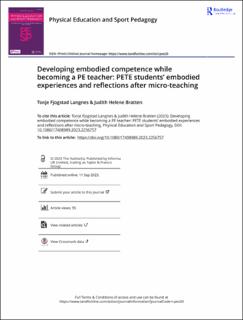Developing embodied competence while becoming a PE teacher: PETE students’ embodied experiences and reflections after micro-teaching
Peer reviewed, Journal article
Published version
Date
2023Metadata
Show full item recordCollections
Original version
10.1080/17408989.2023.2256757Abstract
Background: Becoming a PE teacher is a multifaceted process that involves
many complexities and contextual specificities. Entering their physical
education teacher education (PETE) programme, student teachers are in
a vulnerable position as they are uncertain of their professional
subjectivities. During their PETE programme, students are introduced to
different understandings and practises regarding the body. However, the
importance of the body in the development of leadership and relational
competence has not yet played a prominent role in PETE or its research.
Purpose: Drawing on the concept of embodied professional competence
developed by Winther [(2012). Det Professionspersonlige – om kroppen som
klangbund i professionel kommunikation. Værløse: Billesø & Baltzer], this
paper aims to provide insight into the importance of unpacking
embodiment with PETE students to develop their understanding of how
their body influences their leadership [embodied professional
competence]. More specifically, the question guiding this article is: How
can a focus on bodily experiences contribute to developing PETE
students’ embodied professional competence? Our overall goal has been
to create a more embodied approach to working with PETE students to
develop their (embodied) understanding of their professional
development and (practice of) embodied pedagogies in physical education.
Methods: This is a combined teaching and research project focusing on
PETE students’ professional competence. All PETE students participated in
two teaching series involving them in micro-teaching and reflections
upon their bodily experiences and communication while teaching. Hence,
the data consists of the PETE students’ subsequent written reflections.
Findings: Analysis of the material revealed that reflecting upon their
bodily experiences with micro-teaching requires the PETE students to be
involved in a process of developing their embodied professional
competence. Through the teaching series, they were given the
opportunity to explore and learn how to teach. In a safe community, the
PETE students could be vulnerable and make mistakes while developing
their embodied professional competence.
Conclusions: We argue for the importance of integrating PETE students’
bodily experiences into the PETE programme. The study highlights that
learning how to reflect upon bodily experiences and share them in a safe
community provides an excellent starting point for further development
of the PETE students’ professional teaching identities.

